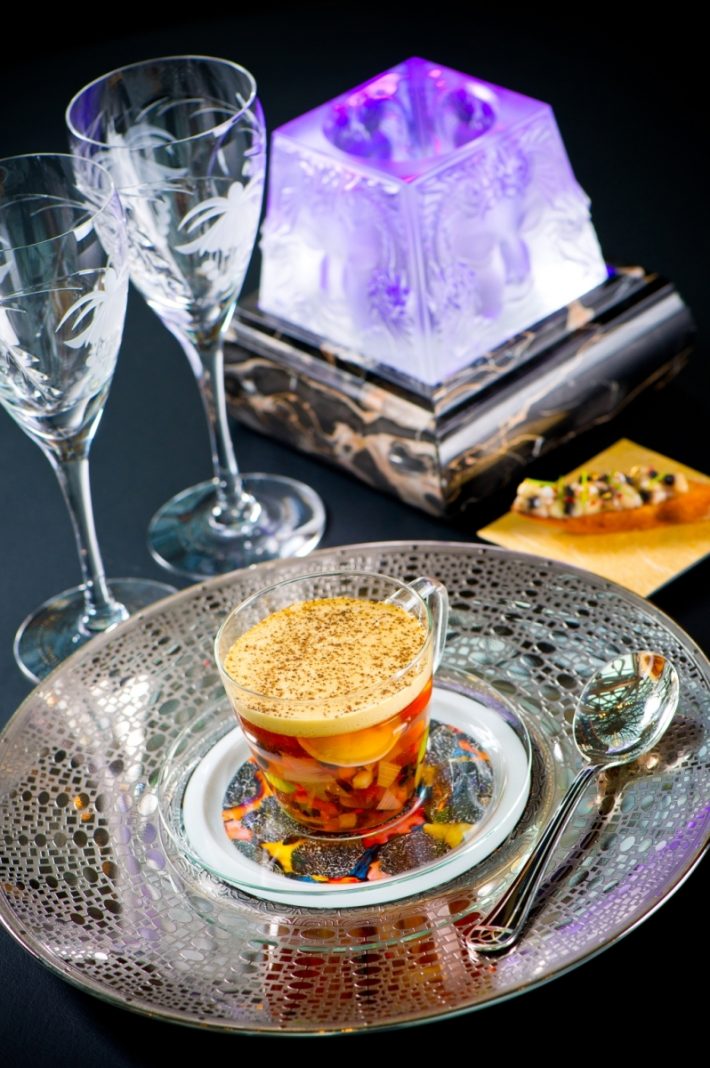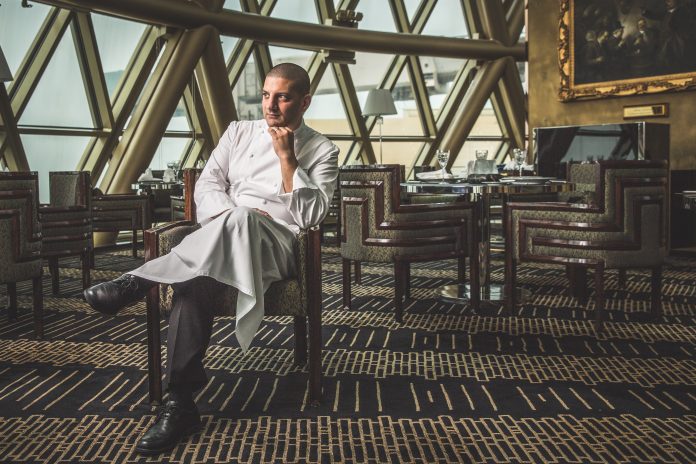
PROFILE 人物
Julien Tongourian
Execitive Chef 总厨
Robuchon au Dôme, a Three Michelin-Starred Restaurant
米其林三星 天巢法国餐厅
Chef Julien Tongourian is currently the Chef de Cuisine (Executive Chef) of Robuchon au Dôme at Grand Lisboa in Macau, a Three Michelin-Starred restaurant and aslo the highest rated French restaurant in the Greater China region. In a recent interview with Chef Julien, he shared with Delta Bridges of his amazing experience at Robuchon au Dôme.
Julien Tongourian大厨目前就任于享誉盛名的天巢法国餐厅。位于澳门新葡京酒店顶层的天巢法国餐厅不仅连续9年荣获米其林三星殊荣,更是被誉为大中华区最顶级的法国餐厅。Delta Bridges本期特邀Julien Tongourian大厨分享他的美食经验。
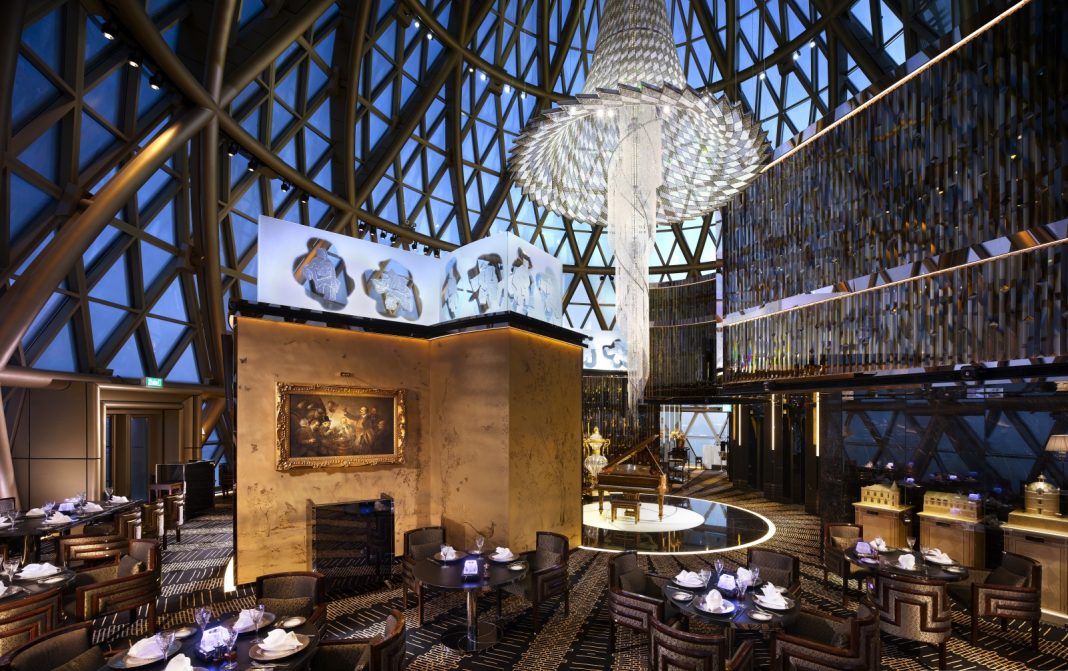
Delta Bridges: Robuchon au Dôme is one of the top restaurants in Asia. Honored, 9 years in a roll as a 3 Michelin Starred restaurant. What is your secret in achieving such a success.
天巢法国餐厅被誉为亚洲最顶尖的餐厅之一,连续九年荣获米其林三星,取得了非常傲人的成绩。您认为成功的原因是什么?
Chef Julien Tongourian: I think that success is not earning 3 Michelin Stars but making people happy – making customers happy. It’s making them discover an experience in a French high-standard restaurant and I think that’s what makes people happy. Performing excellence is either due to the service or the cooking. This is the reason why Michelin guide rewards us three stars.
我觉得成功不是被评为米其林3星,而是去让人觉得开心,让顾客觉得开心。让他们在一家高标准的法国餐厅里收获到属于自己的经历,我觉得那才是最让人开心的。(我们的餐厅)无论是在服务上,还是厨艺上都表现出色,这是米其林给指南我们三星级的原因。
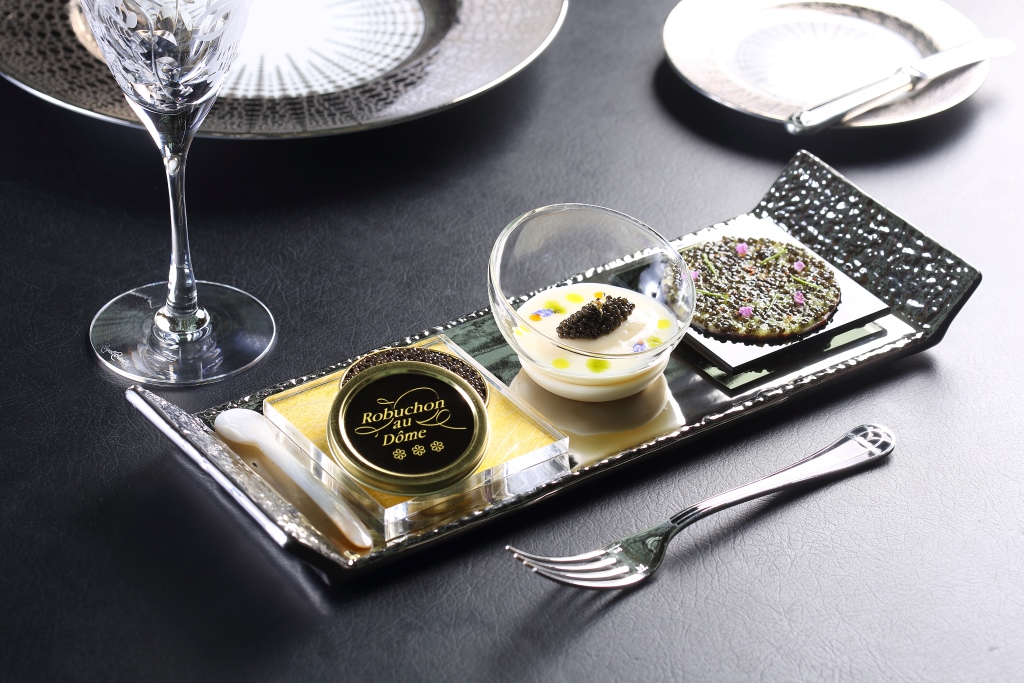
DB: What is “Fine Dining”? Do you think what Michelin Guide sees as “Fine Dining” matched your definition? Why?
您心目中的美食是什么样的?您认为米其林的评价体系是否能代表您对美食的定义?为什么?
JT: The fine dining restaurant status or stars that we have been awarded is due to our choice of products. We select the best products and the freshest products. We have elaborated recipes, an orchestrated service to perfection, a ballet between the kitchen and the dining area and we continue discovering flavors while playing with textures in the dishes. Our plates need to be nicely set, very precise and most importantly we highlight the product. We really have awesome products, either French or products we can find in Asia, mostly in Japan and few locally. We choose the freshest to make our own cooking – our French cuisine. I think that if we have been awarded 3 stars, it’s precisely for the fine dining. This level of excellence gives us precision in work, by all the efforts we make daily to give the best of ourselves, either for lunch or for dinner.
我们被称为高级精致餐厅或是评上星级,是因为我们的产品选择。我们选择最好的、最新鲜的食材。我们有精心设计过的食谱,做到极致完美的服务;有在厨房和就餐区之间的芭蕾舞表演,以及我们不间断地在菜品中发掘更多的口味。我们的餐盘会摆放得整齐美观。最重要的是我们的产品。我们真得有很棒的食材,要么来自法国的,要么是在亚洲能找到的。食材大部分来自日本,几乎不用本地的原材料。我们选择最新鲜的食材来烹饪我们的法国料理。我认为,如果我们餐厅被评为三星级餐厅,那正好是高级精致餐厅的标准。这个卓越的评级让我们清楚知道自己工作的定位。我们会竭尽全力去做好日常的每一份午餐和晚餐。
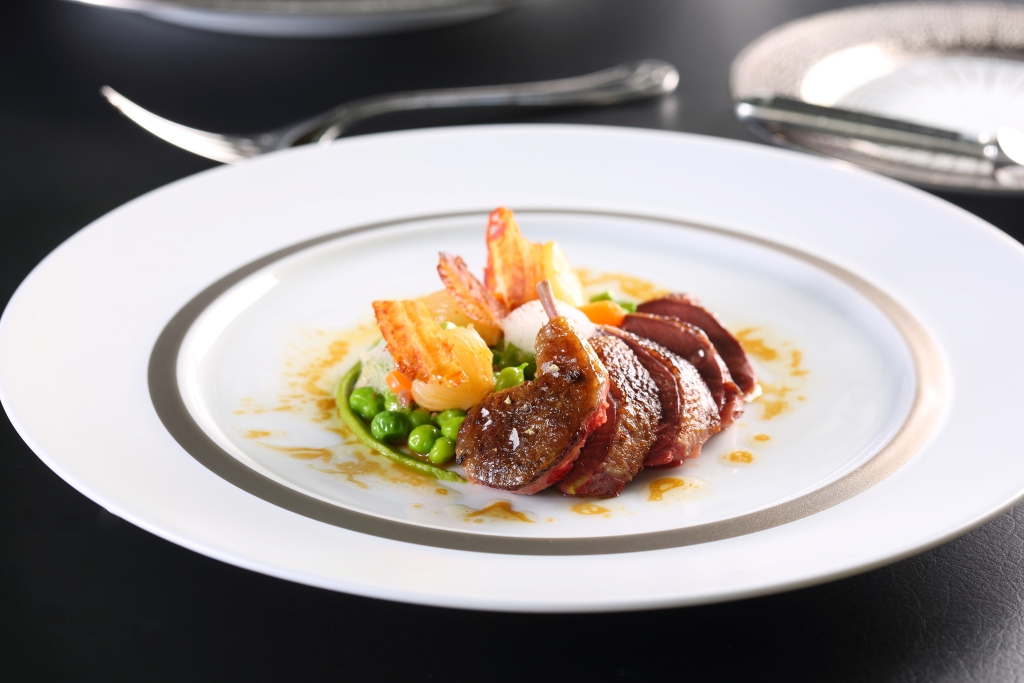
DB: To most Chinese dinners, French Cuisine means delicate, high-end, art, and even takes a long time to appreciate all dishes. What are the key words you would use when describing “French Cuisine”? 说起法国大餐,中国顾客往往会联想到精致、高端,艺术品,还有一个观念是往往很耗时。能否用几个关键词描述一下法国菜的精髓?
JT: The French cuisine is a cooking of sharing, a cooking of tradition. It’s our previous chefs that transmitted us this expertise, so yes, I think that Chinese and Asians in general have the same codes. However, I think that it’s more than that now. It’s really a question of sharing and excellence of our cooking, of achieving the perfect cooking and seasoning. This represents the French cuisine.
法国料理是一门分享、传统的料理。是我们以前的厨师传承给我们这份精湛。我认为中国菜、亚洲菜系一般来说也是这个道理。但是,我认为现在远远不止是那样了。这确实是一个关于分享我们精湛烹饪厨艺、做到完美烹饪和搭配佐料的问题。我认为这些是法国料理的代表。
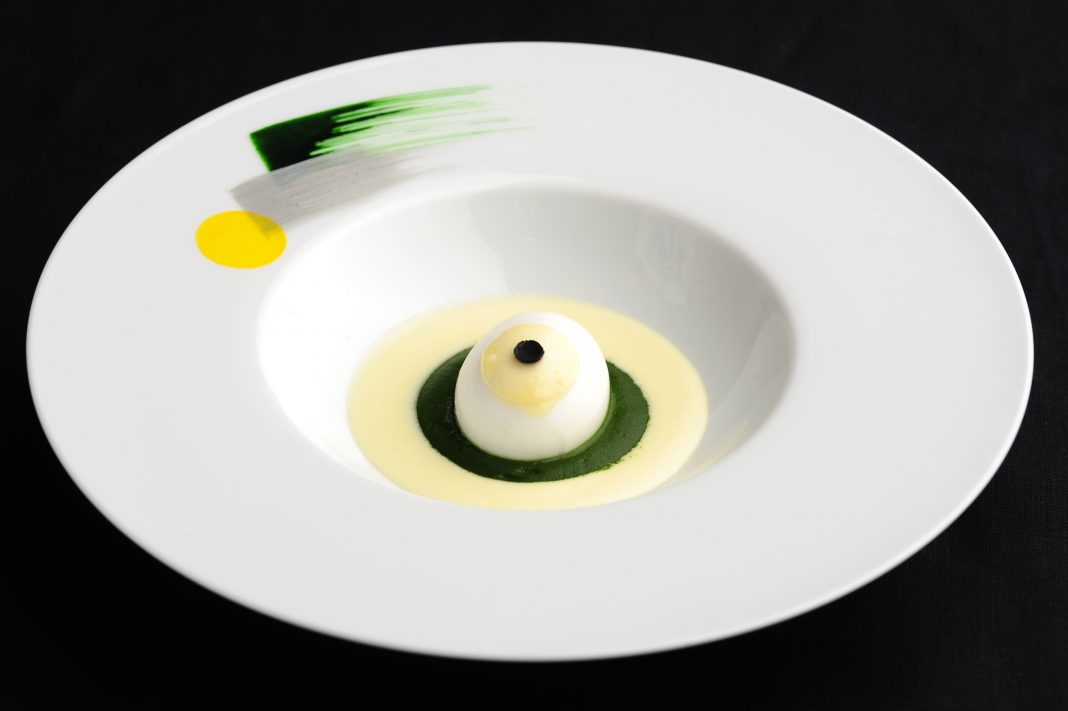
DB: France is a beautiful country with many different regions. What are the differences in Cuisine for different regions? Does Robuchon au Dôme represent a certain region in Cuisine? 法国是一个美丽的国家,法国是否也存在地域性菜系,如同中国有八大菜系一样。如果存在的话,天巢餐厅的流派又从属于哪一派?
JT: I think that our cooking is close to Chinese cooking regarding the fact that there are several regions and similar techniques, but different recipes. Mr. Robuchon is from Poitou-Charentes and he loves using products from his region such as the butter tassel that we use in our dishes for our clients on a daily basis. Also, recipes like the “Couteaux Royal Hare”, which is an emblematical recipe of Mr. Robuchon and a traditional recipe in Poitou-Charentes. Mr. Robuchon doesn’t follow a specific cooking. He uses products that belong to his region which is Poitou-Charentes, such as the butter, but his cooking follows an international inspiration according to the places where he has travelled. Basically, it’s a typical French cuisine but with added inspiration from his trips.
从事实来看,有几个区域,他们有相似的烹饪技巧,但是食谱不一致,因此我认为我们的烹饪和中国的烹饪有相近的地方。品牌创始人 Mr. Robuchon 来自普瓦图-夏朗德,他喜欢用他家乡的食材,像黄油,就是我们为顾客提供的菜品里日常会使用到的原料。另外,像 “Couteaux Royal Hare” 是 Mr. Robuchon 的拿手菜,那也是普瓦图-夏朗德一道传统菜系。 Mr. Robuchon 没有使用什么特殊的烹调方法。他只是用来自他家乡普瓦图-夏朗德的原材料,像黄油,进行烹饪。他烹调的方法是结合他多年旅游各地的经验,从中获得的灵感、改变。从根本上说,(M.Robuchon所烹饪的)是典型的法国菜,但是结合他旅行途中得到的一些创意想法。
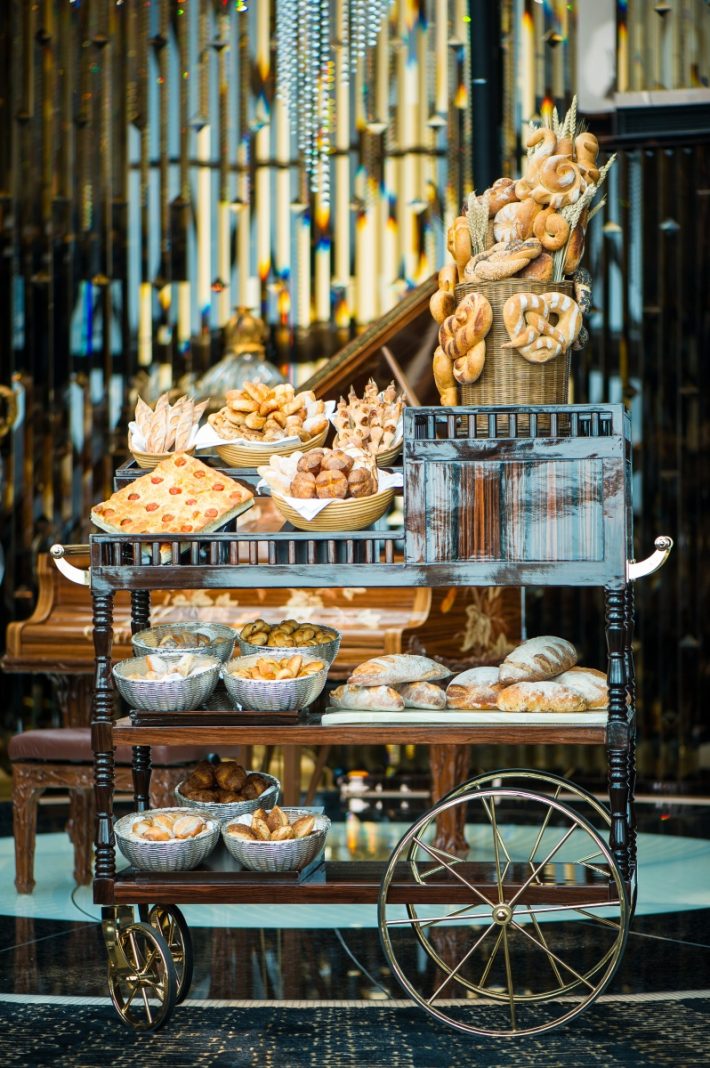
DB: Can you introduce three signature dishes from Robuchon au Dôme?
天巢餐厅的招牌菜式应该有不少,能否介绍最经典最受欢迎的三款?
JT: In summer, so now we have millefeuille with crab and tomato, which is a millefeuille with tomato slices. We peel the tomato, take out the seeds and it is only plum tomato with crab, seasoned with curry, potato and avocado and watercress. The dish is set in layers with a striped tomato coulis. This is a dish we serve during summer. A dish that really reflects winter is black truffle. For Mr. Robuchon, the truffle pie, which is a pie with a fine dough, very crunchy, with stewed onions, bacon and truffle slices, well-seasoned and quickly baked. This is another winter dish for Mr. Robuchon. Now, we have a signature dish by Mr. Robuchon which is beef and foie gras prepared following the Rossini way. It’s foie gras and beef cooked at the same time which we present afterwards in a nice box, smoked at the last minute with beech sawdust.
像现在,在夏天,我们会有蟹肉番茄油酥千层糕,这是一款有番茄片的油酥千层糕。我们把西红柿切片,把籽取出来,把深红色的西红柿,蟹肉,调味过的咖喱,土豆,牛油果,还有,水田芥放在一起。所有食材按分层放好,抹上番茄果酱。这就是我们夏天供应的一道菜。
冬天的代表菜那非黑松露莫属。对 Mr.Robuchon 来说,黑松露派就是一个用优质面粉做成的派,上面配上非常爽脆的烧洋葱、培根和黑松露片,充分调味后,快速烘焙而成。这是 Mr .Robuchon 冬天的一味拿手菜。我们现在还有 Mr. Robuchon 一道标志性菜,是用罗西尼方法烹饪的牛肉和鹅肝。他把鹅肝和牛肉同时一起煮,在最后一分钟用山毛榉木烟熏一下,再把它们放在一个好看的盒子里呈上给客人。
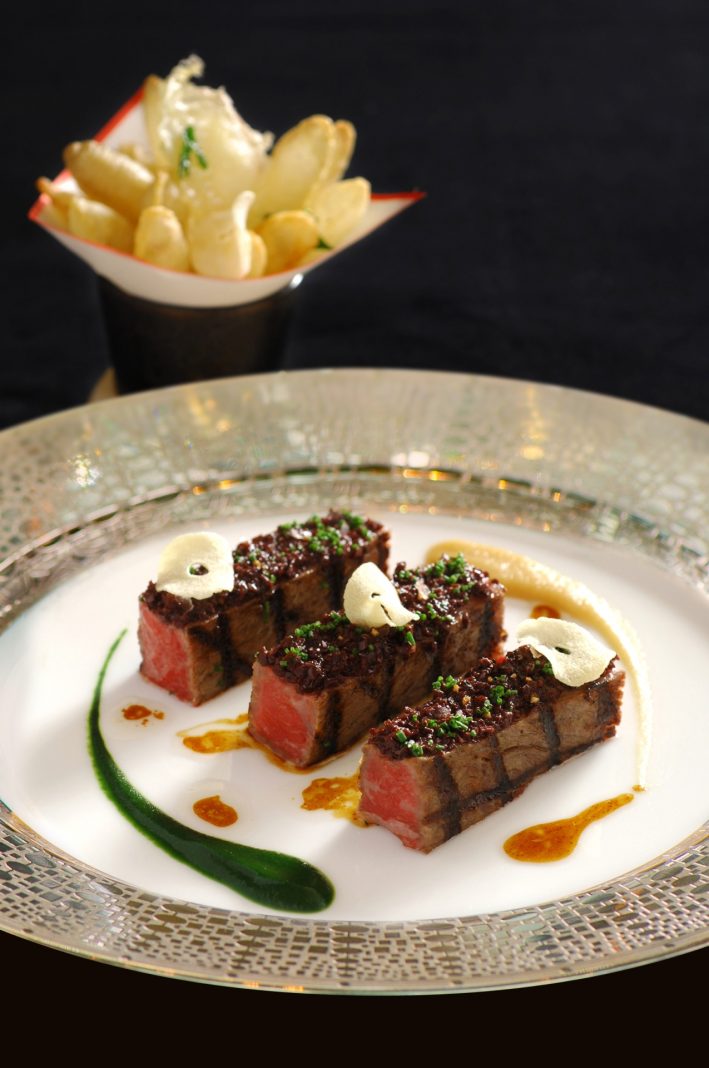
DB: How to become a successful Chef like you? Can you share some of your life stories?
如何才能成长为像您一样出色的主厨?有什么秘诀吗?
JT: For me, success involves a lot of work, self-denial and self-examination on an ongoing basis. I must be here every day to listen to my clients, daily, noon and night. I go to the dining area and consider my clients’ appreciations, get to know if my clients are happy or not with my work. If I have a new dish, I must know if they have any comments. Basically, it’s knowing my clients feedback and putting myself into question every day. It’s a daily work and we have two services per day, so that’s two self-examinations a day – morning and evening. This is what really makes a good chef or not! But personally, I think that I loved cooking from an early age, I have known that I wanted to become a cook since I was seven. When I was younger, we used to go to a little restaurant to celebrate family birthdays in the city where I used to live and once when I was seven the chef took me to see the kitchen. When we left I told my parents that I wanted to be a restaurant owner.
对我而言,成功意味着过程中,伴随着大量的工作,自我否定与自我反省。每天从早到晚,我必须在这里聆听顾客的想法,去就餐区看看顾客是否满意我的工作,思考他们的感谢。如果有新菜品,我需要去知道顾客们有怎样的评价。简单来说,我每天就是去了解顾客的评价和对此进行自我提问、反思。这是我们的日常工作。我们每天有两轮服务时间,因此我们的自我反省一天也有两次——早上和晚上。这很大程度上能决定你是否能成为一个好的厨师!个人来说,我很小的时候就喜欢烹饪。我7岁的时候就知道我长大以后想要成为一名厨师。以前我们家喜欢去我们居住的城里一个小餐馆里庆祝家里人的生日。七岁那年,有一次一个厨师带我参观了厨房。当我们离开那个餐厅之后,我告诉我的父母,我以后想要成为一个餐厅的老板。
